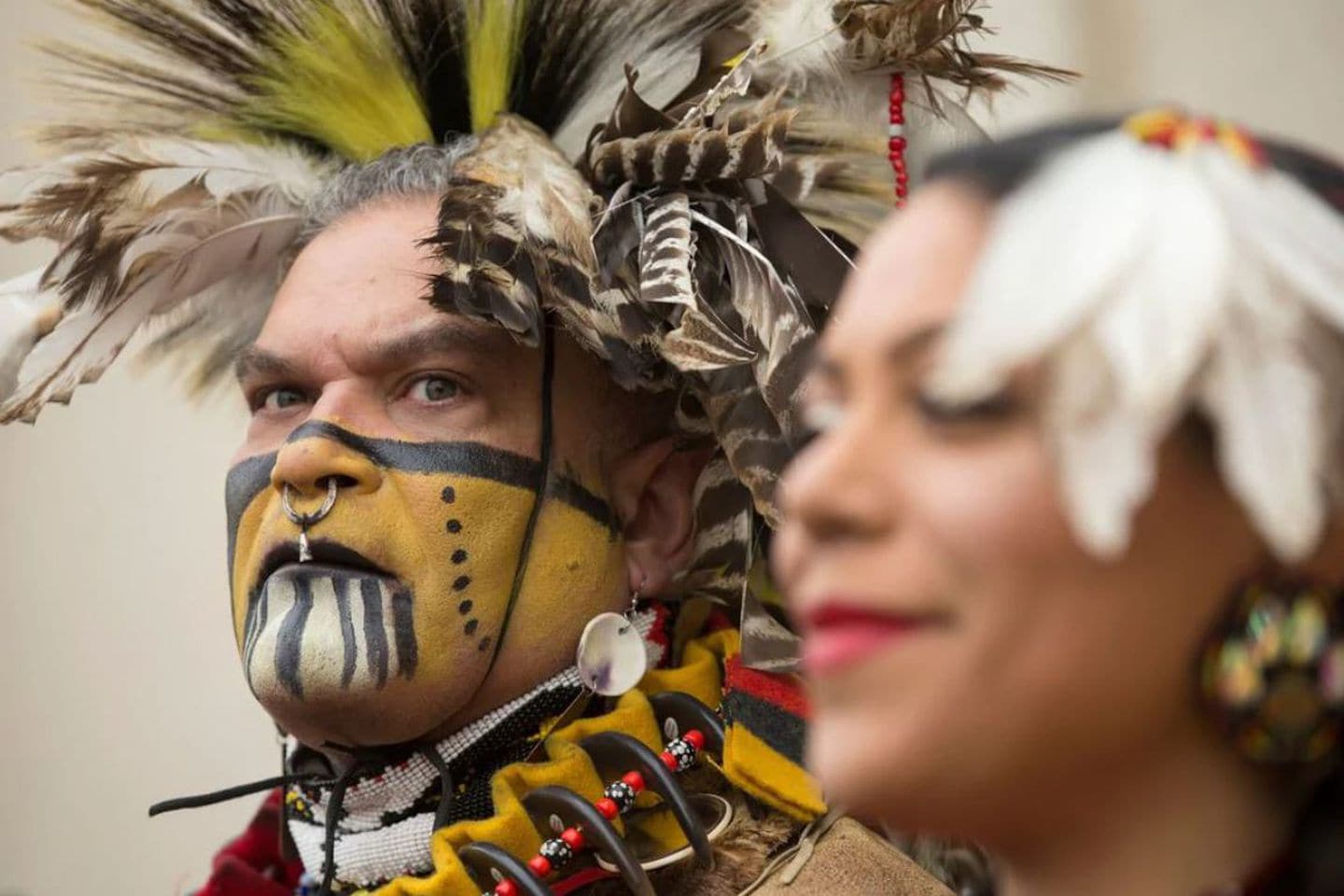Indigenous Peoples’ Day to replace Columbus Day in the District, other jurisdictions

Keith Anderson, member of the Nansemond Indian Nation and director of the American Indian dance troupe Red Crooked Sky, joined fellow troupe member Nikki Bass at the Indigenous Peoples March in Washington earlier this year.
The District and other jurisdictions in the Washington region have passed legislation to change the Columbus Day name in honor of Native Americans. In South Dakota newspaper publisher Tim Giago, Oglala Lakota, pushed Republican Governor George Mickelson to change Columbus Day to Native American Day. Giago was publishing Indian Country Today at the time and his challenge was accepted by the Governor and South Dakota’s legislators passed the bill making the name change official in January of 1990.
D.C. Council member David Grosso (I-At Large) proposed emergency legislation this week — which the council supported Tuesday — to rename Monday’s holiday Indigenous Peoples’ Day. Alexandria and Prince George’s County made similar moves, joining states and jurisdictions across the country that have argued that Christopher Columbus and other colonizers oppressed the native people already living in the Americas when Europeans arrived.
In the District, the bill is awaiting the signatures of D.C. Council Chairman Phil Mendelson (D) and Mayor Muriel E. Bowser (D), according to Grasso’s office. Mendelson and Bowser didn’t respond to requests for comment Thursday.
Grasso said Monday on Twitter that he proposed the legislation to “force a vote of the full Council to finally do the right thing by ending the celebration of the misleading narrative of Christopher Columbus on the second Monday in October in honor of #IndigenousPeoplesDay.”
Grasso, who also opposes the Washington Redskins name, has helped to push a similar bill for the past five years. The legislation passed this week changes the name only for this year, but Grasso said he hopes to make it permanent.
“It’s important for us to recognize the people who were already here before we came over from Europe,” Grasso said. “Too often we’ve done a bad job recognizing Native Americans and given too much credit to Columbus.”
The legislation says Columbus “enslaved, colonized, mutilated, and massacred thousands of Indigenous People in the Americas.” It says the holiday to honor him is “in reverence to a divisive figure whose actions against Indigenous People run counter to the values of equality, diversity, and inclusion — values that the District of Columbia has long embodied — and serves only to perpetuate hate and oppression, in contrast to the values the District espouses on a daily basis.”
The District isn’t alone in the Washington region in changing how it recognizes the holiday.
In Alexandria, the city council unanimously passed a resolution in September to recognize Indigenous Peoples’ Day as a “local, public holiday,” said Craig Fifer, a city spokesman. He said the resolution was effective immediately.
In a statement, Alexandria officials said, “Indigenous Peoples have been and continue to be the victims of prejudice and systematic discrimination, which perpetuates high rates of income inequality and exacerbates disproportionate health, education, and social standing.”
There were roughly 50,000 Native Americans in Virginia, including the Powhatan confederacy that inhibited what is now Alexandria, before English settlers arrived. There are now 11 recognized Native American tribes in Virginia.
In Prince George’s County, council spokeswoman Karen D. Campbell said county leaders passed legislation changing Columbus Day to Native American Day. The legislation was passed Sept. 10 and goes into effect Nov. 8.
Barry Hudson, a spokesman for the Montgomery County executive, said there are no plans to rename the Columbus Day holiday in that county. The city of Takoma Park, in Montgomery, has recognized Indigenous Peoples’ Day since 2017.
The issue hasn’t been discussed publicly in Fairfax or Arlington counties.
Columbus Day, named for the Italian explorer, is celebrated annually on the second Monday in October. The federal holiday recognizes Columbus’s landing in 1492 in the Americas. It first was celebrated as a federal holiday in the 1930s.
The D.C.-area jurisdictions are among several states and local governments across the country that have recognized Indigenous Peoples’ Day, acknowledging harm done to Native Americans and celebrating their history. In the past decade, more than 130 cities have declared Columbus Day as Native American Day or Indigenous Peoples’ Day.
The National Congress of American Indians, an advocacy group that represents Native American tribal governments and Alaska Native groups, applauded the District’s name change for the holiday.
“In a city that itself sits on Piscataway land, we commend the D.C. Council for voting to join the growing number of cities, counties, states, and school districts in formally celebrating Indigenous Peoples’ Day,” NCAI chief executive Kevin Allis said in a statement. “It also acknowledges American Indians and Alaska Natives as thriving, contemporary sovereign nations who hold their rightful place among the American family of governments.”
(Rebecca Tan, Antonio Olivo and Patricia Sullivan contributed to this report that is reprinted from the Washington Post)
